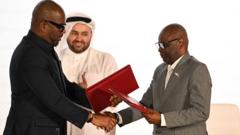Could a New Peace Framework in Qatar End the DR Congo Conflict with M23 Rebels?

Published: 2025-11-15 18:00:19 | Category: world
The signing of a peace framework between Rwandan-backed M23 rebels and the Democratic Republic of Congo (DRC) government marks a significant development in the ongoing conflict in the east of the country. This agreement, facilitated in Qatar, aims to address long-standing issues that have plagued the region and could potentially lead to a resolution of the violence and humanitarian crises affecting millions.
Last updated: 03 November 2023 (BST)
What’s happening now
The recent peace framework signed in Qatar represents a renewed effort to resolve the decades-old conflict that has deeply affected the eastern DRC. The ceremony was attended by representatives from the M23 rebel group and the Congolese government, with mediation from the US and the African Union. The framework includes eight protocols addressing critical issues such as humanitarian access, the return of displaced people, and the protection of the judiciary.
Key takeaways
- The peace framework aims to tackle key issues underlying the conflict.
- Previous peace efforts have failed, making this agreement particularly significant.
- Rwanda's military presence and the disbanding of the FDLR rebel militia are contentious points in the negotiations.
Timeline: how we got here
The path to the current peace framework has been fraught with challenges. Key events leading up to this agreement include:
- January 2023: M23 rebels seize control of large parts of eastern DRC, including Goma and Bukavu.
- June 2023: Talks brokered by the US between Rwanda and DRC yield a peace deal, which is soon violated.
- July 2023: A declaration of principles is signed in Doha, laying the groundwork for further negotiations.
- October 2023: The latest framework for peace is signed in Qatar, addressing multiple aspects of the conflict.
What’s new vs what’s known
New today/this week
The newly signed framework outlines specific protocols that require further work, particularly around prisoner exchanges and monitoring ceasefires. It also highlights the need for humanitarian support and the safe return of displaced individuals.
What was already established
Previous peace initiatives, including a deal brokered by the US in June, have been largely unsuccessful, with violations occurring shortly after agreements were made. The M23 has consistently pushed for talks in Qatar, believing these negotiations address the "root causes" of the conflict more effectively.
Impact for the UK
Consumers and households
The ongoing conflict has significant implications for global markets, particularly in sectors reliant on minerals sourced from the DRC. This could affect prices and availability of electronics in the UK, as the region is a key supplier of coltan and other critical minerals.
Businesses and jobs
The instability in the eastern DRC impacts businesses operating in the region, particularly those in mining and resource extraction. As the government seeks security guarantees, potential trade agreements may arise, influencing job opportunities and supply chains in the UK and beyond.
Policy and regulation
UK policymakers may need to consider the implications of this conflict on foreign aid and trade relations. The situation is likely to evolve as the peace framework is implemented and monitored, potentially prompting discussions in Parliament about the UK's role in supporting peace initiatives in the region.
Numbers that matter
- Thousands: The estimated number of people killed since the escalation of conflict in January 2023.
- Hundreds of thousands: Civilians displaced from their homes due to the violence.
- 8: Number of protocols outlined in the new peace framework that still require work.
Definitions and jargon buster
- M23: A rebel group originating from eastern DRC, with alleged support from Rwanda.
- FDLR: Democratic Forces for the Liberation of Rwanda, a rebel militia based in DRC, primarily composed of Hutu individuals.
- Ceasefire: An agreement to stop fighting, typically in the context of peace negotiations.
How to think about the next steps
Near term (0–4 weeks)
Immediate focus will likely be on operationalising the protocols in the peace framework, including the establishment of ceasefire monitoring mechanisms and humanitarian access.
Medium term (1–6 months)
As the situation develops, attention will shift to the disbanding of the FDLR and the withdrawal of Rwandan troops, which are critical points for the DRC government. Continued international mediation may play a crucial role in these discussions.
Signals to watch
- Progress on prisoner exchanges and ceasefire monitoring.
- Reports on the status of the FDLR and Rwandan troop withdrawals.
- Humanitarian access and the return of displaced persons.
Practical guidance
Do
- Stay informed about developments in the DRC and regional stability.
- Support organisations working to provide humanitarian aid to affected populations.
Don’t
- Assume that peace is guaranteed; ongoing monitoring and support are essential.
- Neglect the broader implications of the conflict on global supply chains.
Checklist
- Review updates from credible news sources about the DRC situation.
- Consider the ethical implications of products sourced from conflict zones.
- Be aware of international responses and the UK's stance on the conflict.
Risks, caveats, and uncertainties
While the signing of this framework is a positive step, the history of failed peace agreements raises concerns about the durability of this new accord. The contentious issues surrounding the FDLR militia and Rwandan troop presence remain unresolved, potentially undermining progress. Furthermore, the humanitarian situation continues to deteriorate, with millions affected by violence and displacement.
Bottom line
The signing of a peace framework between the DRC government and M23 rebels represents a critical juncture in the long-standing conflict in the eastern region. However, the road to lasting peace is fraught with challenges, requiring sustained international engagement and progress on key issues such as troop withdrawals and humanitarian access.
FAQs
What does the peace framework entail?
The peace framework includes eight protocols addressing humanitarian access, the return of displaced people, and ceasefire monitoring, among other issues.
Why is the DRC government demanding Rwandan troop withdrawal?
The DRC government views the presence of Rwandan troops as an infringement on its sovereignty, linking their withdrawal to the disbanding of the FDLR militia.
What impact does this conflict have on the UK?
The conflict affects global supply chains, particularly in industries reliant on minerals sourced from the DRC, which could impact prices and availability in the UK.



